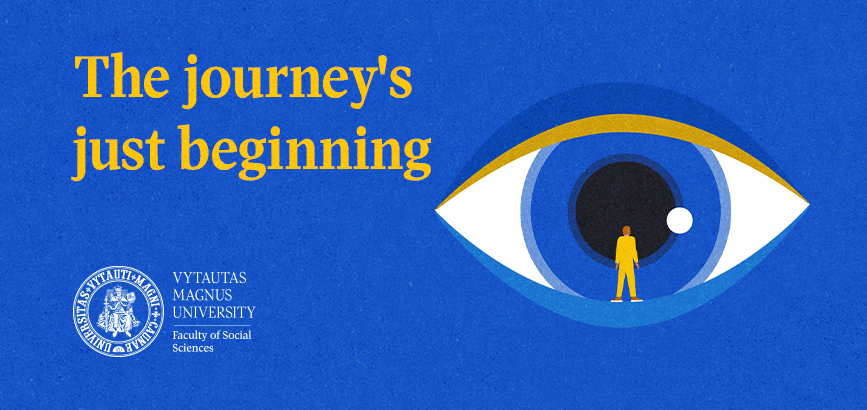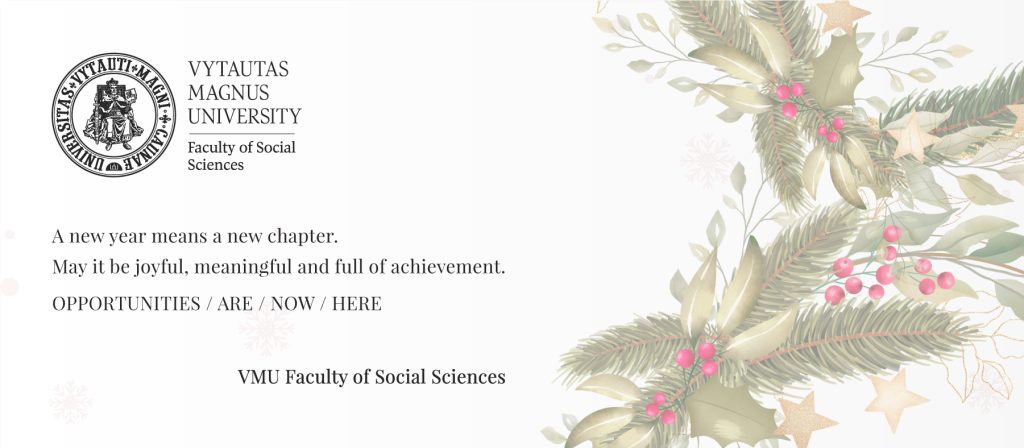Easter greetings from Faculty of Social Sciences
Erasmus+ student Yeray Halifi Morales about his experience while studying at VMU
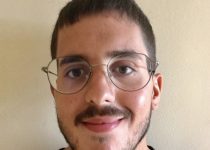 Yeray Halifi Morales from Spain is studying as an Erasmus+ exchange student at the Faculty of Social Sciences at VMU. He kindly agreed to share some insights and tell about his experience at our university.
Yeray Halifi Morales from Spain is studying as an Erasmus+ exchange student at the Faculty of Social Sciences at VMU. He kindly agreed to share some insights and tell about his experience at our university.
- You have spent a semester as an Erasmus+ exchange student at the Faculty of Social Sciences at VMU. Why did you choose our university?
I chose VMU because it was the university that was offered to me in Lithuania at my home university in Spain for the Erasmus programme. When I looked into it, I found it similar to my university in Spain and with interesting courses and that’s why I chose it. Besides, I wanted to go on Erasmus to a country where it was not common to travel from Spain.
- What programme are you studying? Why did you choose to study it?
I am studying a bachelor’s degree in Social Work in Spain, so I am here taking subjects for the master’s degree in Social Work and the bachelor’s degree in Social Sciences, related to Sociology, etc.
I chose to study Social Work because I have always had a critical thinking about social problems and phenomena and I would like to contribute my work and vision to change some of the structural problems that affect the general population.
- How would you generally describe your experience at VMU?
I would describe it as good, I have learned a lot and it has been interesting to have the opportunity to study different subjects from other contexts and in a country different from mine. Perhaps what I like the least is that you always have to do a lot of papers but thanks to them I have learned a lot and they have helped me to acquire the general and specific knowledge of each subject.
- What did you like the most during your studies at VMU?
The way they work is much more flexible than my home university and the teachers try to motivate you with good marks if you do your work well. I also like the holiday time in Lithuania, which has allowed me to enjoy Christmas, something that doesn’t happen in Spain because the first semester exams are in February. I also enjoyed having the opportunity to meet different people in class and make friends with them.
- Which useful competencies do you think you acquired during your Erasmus+ exchange period?
I think I have gained independence, I have opened my mind more, I am more tolerant, critical and positive about my surroundings. Living in another country, with a totally different culture and climate has helped me to see things differently and to understand and appreciate things that I didn’t before. Also, meeting people from so many different places has been a pleasure and something that I will always take with me. Having the opportunity to do Erasmus abroad is great.
- Would you recommend VMU for other students who want to study abroad? Why?
Yes, I would recommend VMU to more people in my faculty because I think that living in Lithuania is an experience and I liked VMU as a university because it allowed me to learn in a different way and I liked the way it works, its flexibility as I said before.
- What are your career plans for the future?
I would like to work full time as a social worker and that’s why I’m studying it, I don’t know if in Spain or abroad because it’s difficult if you don’t speak the mother tongue of the specific place but I would really like to focus on social policies or the international scene, European Union… it would be great to get it, although I’m a bit scared because it’s difficult to get a job in Spain.
- Is there anything else you would like to add?
I wanted to thank Laura Lapinske for her work and for giving me the opportunity to express myself in this interview. It has been great to have her as a teacher in the first semester and to have been able to develop my critical thinking in Social Work. I hope this semester will be as good as the first one!
Interview conducted by Laura Lapinskė, International relations coordinator of the Faculty of Social Sciences at VMU
VMU invites to a Seminar about Anthropology and Climate Change
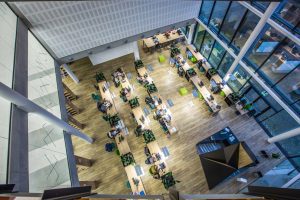 The Center for Social Anthropology at the Faculty of Social Sciences at Vytautas Magnus University cordially invites to the online research seminars given by graduates of Social Anthropology Master study program at Vytautas Magnus University.
The Center for Social Anthropology at the Faculty of Social Sciences at Vytautas Magnus University cordially invites to the online research seminars given by graduates of Social Anthropology Master study program at Vytautas Magnus University.
Coming presentation is on 22 February, 2022, 5:00 p.m. Lithuanian time.
Presenter: Daina Pupkevičiūtė (doctoral student of the Institute of Cultural Research at the University of Tartu, Estonia).
Presentation: “Anthropology and Climate Change: Reflections On and Insights From Ongoing Ethnographic Fieldwork in France”.
Abstract: Climate crisis has been in the making for several decades now. As such climate crisis extends beyond an ethnographic object and – due to its all-encompassing nature – is a backdrop of any and all (research) activity we are undertaking at present. Once starting my doctoral research project in an Alpine storm struck valley, I focused on what role relationships we cultivate have in shaping the understanding of climate crisis as well as action in the context thereof. I was and still am interested in relationships between the humans and their non-human kin, which, for me, means non-human-species, landscapes and various agents within them. The storm of a magnitude previously unseen, according to the field participants, in the valley I am currently based, was a point of departure for the exchanges with the inhabitants of the valley. As expected, the question I came with proved to be rather vast and I soon found myself at a loss in the entanglements of beings and things, power and history, all of which transgress the physical boundaries of a series of valleys and canyons etched into ancient rock. However, while I am redesigning, rethinking and reevaluating my steps in the mountains, a question I am asking myself and my colleagues – those in the field as well as those in the discipline of anthropology is – how can the knowledge we are entrusted with through encounters and experiences be feedforwarded to make our research practice useful.
The registration is necessary – registration link
Junbin Shao from China about MA studies in Social Work at VMU
 Junbin Shao from China is finishing his MA studies in Social Work at VMU. He kindly agreed to share some insights and tell about his experience at our university.
Junbin Shao from China is finishing his MA studies in Social Work at VMU. He kindly agreed to share some insights and tell about his experience at our university.
- Junbin, you are about to graduate and receive the MA diploma in Social work. How did you decide to study social work? And why did you choose VMU?
I grow up in a brain-drain area with many social problems. I keep thinking about the causes and try to figure out the solutions. So I decided to study social work in my undergraduate study, and then it was not a surprise that I would continue the exploration. I noticed that the social work programme in VMU offers some interesting courses, and it is not too clinical-oriented. So I decided to study at VMU.
- How would you generally describe your experience at VMU?
It is inspiring and fairly good. Although I had to conduct my first-year study remotely, my learning experience was still satisfactory. I seized the opportunities provided by VMU, took part in an academic conference, exchange study, summer school and gained valuable experience and progress.
- What did you like the most during your studies at VMU?
I feel supported by teachers and other staff. They are willing to provide me supports based on needs and upon request, without which it will be hard for me to achieve what I want.
- What are your career plans for the future?
I plan to take a job in the social service field first. There are too many factors that remain unknown, but I hope I can contribute to social justice in the ways I like.
- Which useful competencies do you think you acquired during your studies at VMU?
I have certainly improved my skills in intercultural understanding and communication. Also, I advanced my critical thinking.
- What would you like to wish for future students of social work?
When doing assignments or research, focus on what attracts you and be as creative as possible. In this way, you may be well driven, full of enthusiasm, and harvest something valuable. Otherwise, it may be painful…
- Thank you for your answers and good luck with your future projects, Junbin!
Interview conducted by Laura Lapinskė, International relations coordinator of the Faculty of Social Sciences at VMU
Visiting Lecturer dr. Kelly Melekis in Social Work at VMU
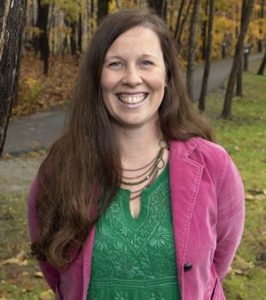 This semester, Kelly Melekis is a Visiting Lecturer in Social Work at Vytautas Magnus University. Dr. Melekis is here as a U.S. Fulbright Scholar and will be available for lectures and consultation in social work education, research methods, and gerontology. An Associate Professor and Chair of the Social Work Department at Skidmore College in upstate New York, Kelly received her BSW from the University of Vermont (UVM), MSW from the University of California at Berkeley, and PhD in Sociology and Social Work from Boston University. She holds a Certificate in Gerontology and is certified as an End-of-Life Doula.
This semester, Kelly Melekis is a Visiting Lecturer in Social Work at Vytautas Magnus University. Dr. Melekis is here as a U.S. Fulbright Scholar and will be available for lectures and consultation in social work education, research methods, and gerontology. An Associate Professor and Chair of the Social Work Department at Skidmore College in upstate New York, Kelly received her BSW from the University of Vermont (UVM), MSW from the University of California at Berkeley, and PhD in Sociology and Social Work from Boston University. She holds a Certificate in Gerontology and is certified as an End-of-Life Doula.
As a gerontological social worker, Dr. Melekis’ scholarship focuses on 1) the health and well-being of vulnerable and oppressed older adults, particularly in terms of homelessness, housing, and social environment, and 2) the education and training of social workers, especially in terms of interprofessional practice in health and aging. Underlying the substantive content of her research are methodological considerations rooted in social justice and a commitment to including the voices and perspectives of marginalized populations and those who serve them, thereby providing a comprehensive sense of what works, for whom, and in what ways. Her work contributes to improved policy, program development, and effective interprofessional practice.
Kelly teaches courses on social work practice, research methods, and death, dying and bereavement. A gerontological social worker, her research and scholarship focus on improving the life conditions or experiences of vulnerable older adults, such as those experiencing homelessness, abuse and/or neglect. She conducts primarily community-based research, with an emphasis on collaborative, participatory methods. Kelly has practiced as a clinical social worker in geriatric mental health and substance use, and taught social work practice, policy and research at Boston University, University of Hawaii, and University of Vermont. In addition to precious time singing, dancing and laughing with her two daughters, and cooking yummy vegetarian food with her husband Mark (who is also a social worker!), Kelly loves traveling, reading memoirs, live music, the original Star Trek series, and maple lattes.
SMF Kalėdinis sveikinimas
Dear students of the Faculty of Social Sciences
 At Vytautas Magnus university we are always looking for ways to improve your experience as a student. An important element in improving is to collect feedback from you. For that reason, we have decided to test out a micro-survey in the Faculty of Social Sciences in collaboration with StudentPulse. The purpose of these micro-surveys is to collect feedback from you as a student.
At Vytautas Magnus university we are always looking for ways to improve your experience as a student. An important element in improving is to collect feedback from you. For that reason, we have decided to test out a micro-survey in the Faculty of Social Sciences in collaboration with StudentPulse. The purpose of these micro-surveys is to collect feedback from you as a student.
More specifically, this means that you will receive your first micro-survey from us in a few days and once a month after that. The surveys contain few questions which makes it easy to complete. It will take no more than few minutes to complete. The micro-survey is anonymous.
You will hear from us again, when we are ready with the first round of surveys to begin.
Read more about StudentPulse’ micro-surveys.
We expect and hope that you will be encouraging about the surveys and believe in the importance of your voice and the potential to change your experience as a student!
Faculty of Social Sciences in collaboration with studentpulse
President’s poll on Istanbul Convention draws criticism – it ‘doesn’t add clarity’
 The 2011 Council of Europe’s Convention on preventing and combating violence against women and domestic violence – better known as the Istanbul Convention – has yet to be ratified by the Lithuanian parliament, but has drawn opposition from socially conservative MPs and activists.
The 2011 Council of Europe’s Convention on preventing and combating violence against women and domestic violence – better known as the Istanbul Convention – has yet to be ratified by the Lithuanian parliament, but has drawn opposition from socially conservative MPs and activists.
The office of President Gitanas Nausėda has commissioned a poll, asking respondents “Do you agree that Lithuania has to ratify the Istanbul Convention?”
Almost half, or 48.8 percent, said they “disagree” or “rather disagree”, while 22.1 percent of those polled said they fully or rather agreed. Another 29.2 percent had no opinion on the issue, Delfi.lt reported. The pollster Vilmorus polled 1,001 people by phone between April 8 and 17.
Professor Aušra Maslauskaitė of Vytautas Magnus University says that the president’s poll does not show what the public actually thinks about fighting violence against women.
“The single question, as it is formulated, does not give us the Lithuanian public’s opinion on the Istanbul Convention,” the sociologist said. “What it may tell us is that they have heard the document mentioned somewhere in the media.”
Another scientist, Milda Ališauskienė of Vytautas Magnus University, says that the polling itself merely pours fuel on the fire and does not advance informed discussion.
“The question is improperly worded, since it is not clear what is meant by the ‘Istanbul Convention’,” she told LRT RADIO. “The fact that the public has been agitated over the document thus named does not tell us anything about the problems it addresses.”
“This poll tells us the society is agitated, […] but not what it thinks about domestic violence, sexual violence and its prevention, […] the assistance currently available, or relations between genders,” she added.
“We saw a lot of disinformation and politicking around this issue [the Istanbul Convention] throughout winter and early spring, as well as non-constructive discussion, so I am surprised to see this poll which, I agree, does not add any clarity,” she added.
VMU to host Conference on Family, Class and Inequalities
 Social Research Center of Vytautas Magnus University (VMU) would like to invite you to online Conference “Family, Class and Inequalities in Central and Eastern Europe” which will take place on October 28-29th, 2021.
Social Research Center of Vytautas Magnus University (VMU) would like to invite you to online Conference “Family, Class and Inequalities in Central and Eastern Europe” which will take place on October 28-29th, 2021.
Three decades of transition to capitalism and liberal democracy in Central and Eastern Europe have reshaped the everyday life of the region’s families. Research has documented new patterns in family demography, gender and intergenerational relationships, practices and discourses on parenthood, and trends in family policies as well as the growing complexity of family. Yet, the class-based divisions in the family life remain sparsely covered in the scientific discourse within the region.
The conference aims at bringing together scholars who examine various domains of family life through the lens of class and inequalities in Central and Eastern Europe. We invite papers that present current empirical research both qualitative and quantitative findings as well as papers dedicated to theoretical and methodological issues related to the conference theme. We welcome papers based on both the cross-national analysis and single country studies.
The thematic scope of the conference includes, but is not limited to, the issues of:
- family formation, dissolution and stratification
- gender division of labor in the family
- motherhood and fatherhood
- family and work
- family diversity
- family policies and politics
- family values
- families and generations
The abstract submission deadline is June 20, 2021. We invite to submit abstracts (max 300 words) via the link on our conference website.
The prospective participants will be notified by the organizing committee’s decision by July 30, 2021.
All conference related inquiries may be directed to familiesconference2021@vdu.lt
Organizing committee:
Prof. Milda Ališauskienė
Assoc. Prof. Jurga Bučaitė-Vilkė
PhD student Irma Dirsytė
PhD student Ieva Dryžaitė
Dr. Rasa Indriliūnaitė
Prof. Aušra Maslauskaitė
Prof. Artūras Tereškinas
WOMEN LEADERS IN MANAGEMENT AND RESEARCH AT VMU
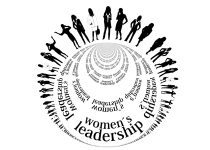 https://www.genderportal.eu/resources/women-leaders-management-and-research-vytautas-magnus-university-lithuania
https://www.genderportal.eu/resources/women-leaders-management-and-research-vytautas-magnus-university-lithuania




